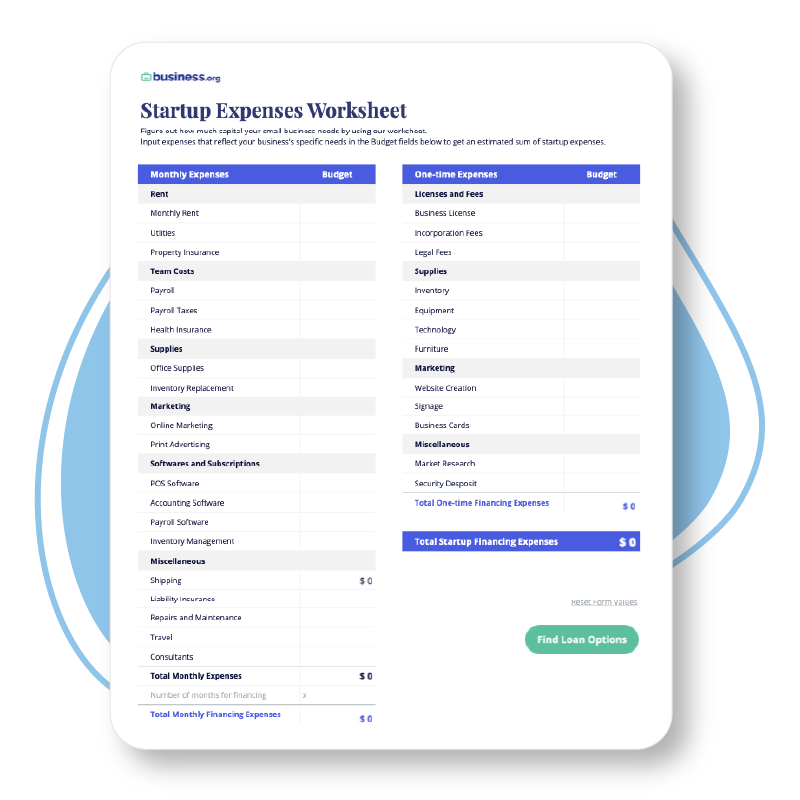We are committed to sharing unbiased reviews. Some of the links on our site are from our partners who compensate us. Read our editorial guidelines and advertising disclosure.
Guide to Startup Business Grants: Get Free Money for Your Business
On paper, grants sound like the perfect funding option for most small businesses. After all, grants give you money to spend on your business―but unlike loan money, you never have to pay it back. What’s not to love?
Well, as great as grants are, they do have some downsides. But should those downsides stop you from applying?
In this guide to startup business grants, we’ll help you decide. We’ll show you how grants work (the good and the bad) and tell you how to find grants for your business. We’ll also point you toward some alternative financing options, in case grants don’t work out for you.
What is a startup business grant?
If you didn't know what a startup business grant is, it does just what it sounds like. It grants funding to startups, small businesses, or nonprofits—and the funding comes from an organization or the government. Although this sounds great, competition for grants is fierce.
Let's look at some more pros and cons to help you see if they're the right fit for your business.
Pros and cons of business grants
How to get small-business grants
As we already said, grants give money that you don’t have to repay. That means you’re getting free funds for your business.
Of course, actually getting and using those funds can get a little more complicated. Here’s what you need to know.
1. Find a relevant grant
If you want to get a startup business grant, first you need to find a grant to apply for.
Maybe you already have one (or more) in mind. In that case, you can skip ahead to the next step. If you don’t, it’s time to start looking. We have some tips on where to look (which we’ll come to in just a bit).
Remember, though, that you’re not just looking for any grant. You’re looking for a grant that you can use for your business. Most grants specify how the funds can be used. So if you want to buy equipment, for example, don’t bother with grants that have to be used to hire more staff.
Once you think you’ve found a grant, it’s time to take a closer look at the application requirements.
2. Make sure you qualify
Most grants require applicants to meet certain eligibility requirements.
For example, the grant-giving organization might require you to have a for-profit business. The requirements can get much more specific than that though. Take the Asian Women Giving Circle Grant. Applicants must be Asian American women with a nonprofit in New York City.
So before you start an application, make sure you and your business meet all the relevant requirements for your grant of choice. Otherwise, you could waste time on a grant you’ll never get.
Now, the good news is that most grants stick to demographic qualifications or industry qualifications―things about you or the area you work in. They don’t, however, usually care about things like your personal credit score. Likewise, you won’t find too many grants that have strict revenue or time in business qualifications.
That means you can often qualify for grants even if you can’t qualify for business loans―making grants great for startup funding.
When you’re sure you qualify for the grant you want, you’re ready to begin your application. After all, grants don’t get handed out willy-nilly to anyone who wants them―you have to win them.
3. Work on your application
Depending on the grant you’re applying for, the application can range from answering a few basic questions about your business to very involved essays, videos, and budget proposals. In other words, you should plan on investing some time in your grant application.
That said, you should consider how involved the grant application is and compare that to the grant award amount. It may be worth pouring hours and days into an application for a $60,000 grant―but you might not want to invest that much time in a $1,000 grant.
By signing up I agree to the Terms of Use and Privacy Policy.
4. Submit your application
Assuming you still decide to apply, though, you can finish and submit your application.
Make sure you fill out the application completely and submit all the required parts. After all, your application will probably have quite a bit of competition.
And watch out for deadlines. Many grant applications have a very strict submission deadline. Don’t miss it, or you’ll have to sit out that grant cycle.
5. Wait to see if you get the grant
While we know you want to hear back about your application right away, you probably won’t get an answer for a while.
Most grants get quite a few applicants. And the more broad the grant requirements, the more applicants they’re likely to get.
Because so many business owners apply, it can take a long time to find out whether or not you won the grant. After all, someone has to review all those applications.
So settle in for a long wait. But do make sure you check your email and voicemail regularly to make sure you don’t miss any important communications about the grant―like telling you that you won.
6. Use your grant money
If you’re lucky, you’ll win the grant.
Congratulations! You got free money. That doesn’t mean you can spend your grant money however you want though. Most grants earmark the funds for certain uses. (Fortunately, they tell you about those uses upfront.)
As you spend your grant money, make sure you use it on those designated uses. If you don't, you could end up on the hook for repaying your improperly used funds.
Most grants publish a list of their winners, which means you’ll get some free publicity for your business. (So make sure your business website is updated and operational.)
Where to find startup grants
Now that you know how to get a startup business grant, how do you actually find one you want?
Mostly, you’re going to have to put in some time and effort to look.
As we said earlier, we suggest looking locally if possible. Ask around at local small business development centers, business expos, and other places.
But yes, you can look online too. That’s how we found some of our favorite grants for startup businesses.
Grants for small businesses
Another good place to look is grants.gov. It lists all current government grant opportunities.
And you can always look at grants for special groups.
Grants for specific groups
While business lenders can’t choose to give money only to certain groups―like women, veterans, or minorities―grant programs can. So if you’re in one of those groups, look for grants targeted at you.
If you’re a female business owner, you can check out our roundup of the best small-business grants for women. Some opportunities are open to all female entrepreneurs, while others get more specific.
If you’re a minority business owner, there are grants just for you. We have a list of the best business grants for minorities to get you started.
And if you (or your spouse) served in the US military, you might be able to qualify for grants for veterans.
Startup grant alternatives
Before we wrap this guide up, we want to pause for a brief reality check.
Grants are great, and we highly recommend applying for them―but realistically, you can’t count on getting grant funding. (Sorry.)
Startup business grants are very, very competitive. Even if you have the best application, you can’t guarantee that you’ll win a grant.
With that in mind, we want to suggest some other business financing options you can look at.
Business loans
Unlike grants, you have to repay small-business loans. But if you need working capital, you may find that loans are worth the cost.
As a young startup, you’ll have somewhat limited options for business loans. Traditional lenders (banks) won’t even look at you.
You’re better off applying with online lenders, like the ones on our list of the best small-business loans for startups.
Enter your loan needs and qualifications to get matched with a list of lenders best suited to you. Then, sort by the financing factor that you find most important. (Note: not all lenders allow personal loans for business use.)
Crowdfunding
Crowdfunding offers another way to get free money for your business. In most cases, you don’t have to repay the funds you get through crowdfunding (though you’ll probably have to reward your backers somehow).
Plus, you can crowdfund even with a very young startup. Just keep in mind that crowdfunding tends to work better for product-based businesses rather than service-based businesses.
Our guide to crowdfunding for startups explains how you can get started with crowdfunding platforms.
Other options
You’ve got more financing options than just grants, loans, and crowdfunding. Here are some other popular funding methods:
- Borrowing from family and friends
- Personal assets
- Angel investors
- Venture capitalists
The takeaway
Startup business grants can be a great way to fund your business, since you don’t have to repay the money and you don’t have to meet any credit requirements. But grants often have involved applications and competitive applicant pools, so they’re not right for every small-business owner.
If you can find relevant grants that don’t take too long to apply for, we highly recommend submitting an application. Just remember you can’t count on grant funding―so make sure you have a backup plan.
Interested in other funding options with no (or low) credit requirements? Check out our rankings of the best bad credit startup loans.
Related content
Startup business grants FAQ
There are multiple ways to get funding for your startup—grants being just one of them. We cover a few briefly in this article (including business loans, crowdfunding, and other options), but we discuss the options in depth in our Best Small-Business Funding Options.
If you are just looking at grants though, we recommend looking on Grants.gov.
The government only provides grants for nonprofits and educational institutions. So unless your business is a nonprofit, you're out of luck.
No, the SBA stopped accepting PPP loan applications on May 31, 2021.
Disclaimer
At Business.org, our research is meant to offer general product and service recommendations. We don't guarantee that our suggestions will work best for each individual or business, so consider your unique needs when choosing products and services.







